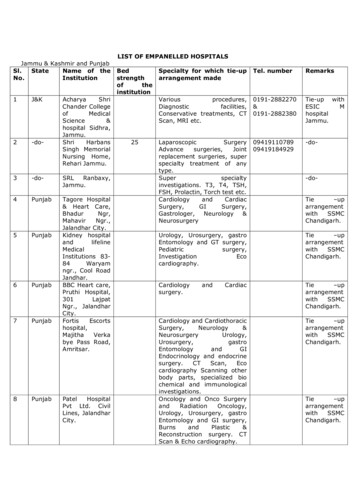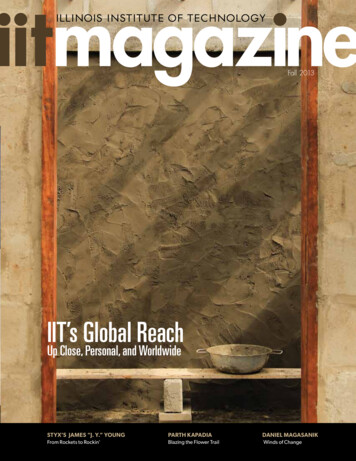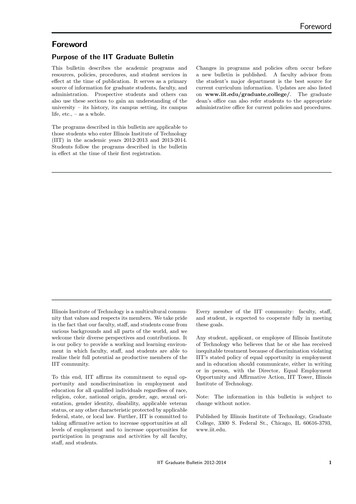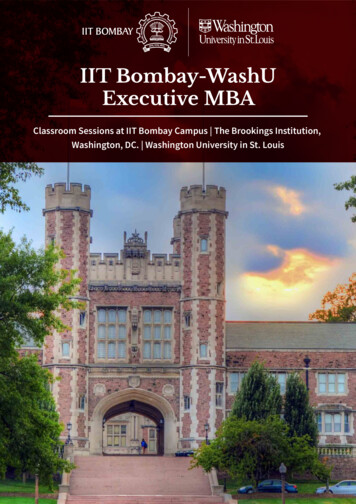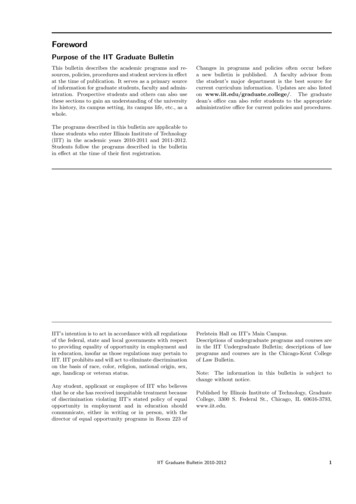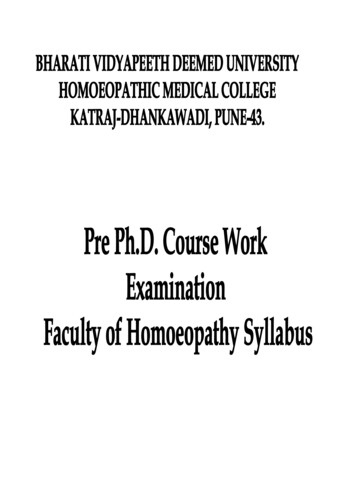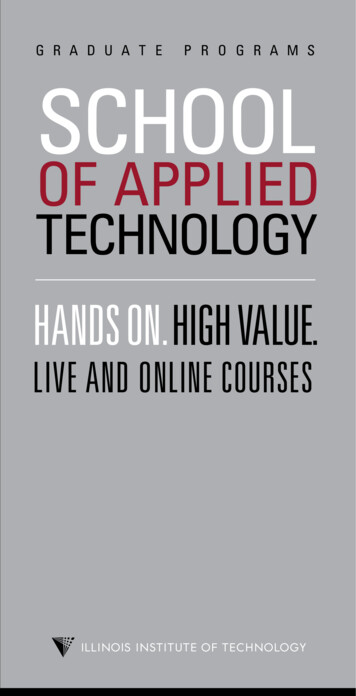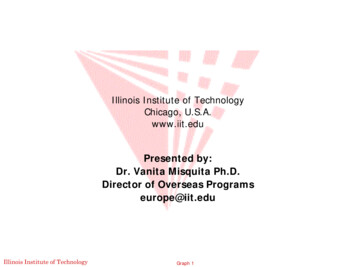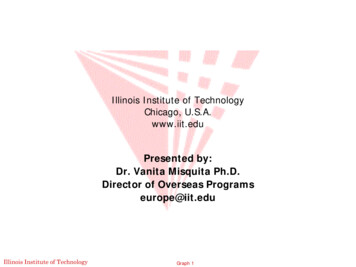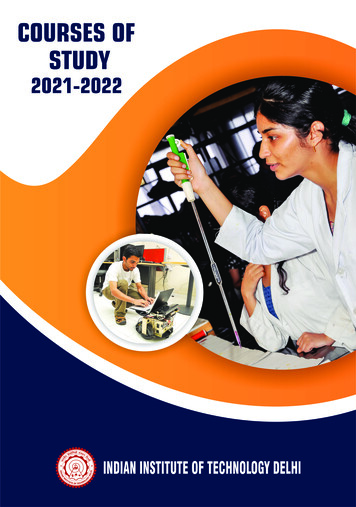
Transcription
COURSES OF STUDY2021-2022Undergraduate ProgrammesBachelor of TechnologyDual Degree (B.Tech. M.Tech.)Postgraduate ProgrammesP.G. Diploma of I.I.T. DelhiMaster of ScienceMaster of Business AdministrationMaster of DesignMaster of TechnologyMaster of Science (Research)Master of Public PolicyDoctor of PhilosophyINDIAN INSTITUTE OF TECHNOLOGY DELHIHauz Khas, New Delhi 110 016, India.http://www.iitd.ac.in
This book is available at the IIT Delhi d.ac.in/curriculum.phpIn case of queries, please visit IIT Delhi website or contact:Undergraduate ProgrammePostgraduate ProgrammeAssistant Registrar (Academics - UGS)Joint Registrar (PGS&R)Ph.: 91 11 2659 1718Ph.: 91 11 2659 1737E-mail : arugs@iitd.ac.inE-mail : drpgsr@iitd.ac.indrpgsr@iitd.ac.in adres@admin.iitd.ac.inadcur@admin.iitd.ac.in Copyright : IIT DelhiProduced by : Publication Cell, IIT DelhiAugust 2021ii
d.1Departments, Centres and Schools.1Programmes Offered.2Entry Number.6Honour Code.62.COURSE STRUCTURE AND credit sYSTEM.6-132.1Course Numbering Scheme.62.2Credit System.72.3Assignment of Credits to Courses.72.4Earning Credits.82.5Description of Course Content.82.6Pre-requisites.92.7 Overlapping / Equivalent Courses.92.8Course Coordinator.92.9Grading System.92.10Evaluation of Performance.123.REGISTRATION AND attendance. 13-163.1Registration.133.2Registration and Student Status.143.3Advice on Courses.143.4Validation of Registration.143.5Minimum Student Registration in a Course.143.6Late Registration.143.7Add / Drop, Audit and Withdrawal of Courses.143.8Semester Withdrawal.153.9Registration in Special Module Courses.153.10Registration for Non-graded Units.153.11Pre-requisite Requirement(s) for Registration.153.12 Overlapping / Equivalent Courses.153.13Limits on Registration.163.14Registration and Fee Payment.163.15Continuous Absence and Registration Status.163.16Attendance Rule.164. UNDERGRADUATE DEGREE REQUIREMENTS, REGULATIONS AND PROCEDURES. 17-274.1 Overall Requirements.174.2Breakup of Degree Requirements .174.3Non-graded Core Requirement .194.4Minimum and Maximum Durations for Completing Degree Requirements.214.5Absence During the Semester.214.6Conditions for Continuation of Registration, Termination /Re-start, Probation and Warning.224.7Scheme for Academic Advising of Undergraduate Students.234.8Capability Linked Opportunities for Undergraduate Students.254.9Change of Programme at the End of the First Year.264.10Self-study Course.274.11Assistantship for Dual-degree Programmes.274.12Admission of UG Students to PG Programmes.274.13Measures for Helping SC / ST Students.275.POSTGRADUATE DEGREE REQUIREMENTS, REGULATIONS and Procedures. 28-365.15.25.35.45.55.6Degree Requirements.28Continuation Requirements.28Minimum Student Registration for a Programme.28Lower and Upper Limits for Credits Registered.28Audit Courses for PG Students.28Award of D.I.I.T. to M.Tech. / M.B.A. Students.29iii
5.75.85.95.105.115.125.136.Regulations for Part-time Students.29Leave Rules for P.G. D.I.I.T., M.Des., M.Tech. and M.S. (Research).29Assistantship Requirements.29Summer Registration.29Master of Science (Research) Regulations.30Migration from one PG Programme to another PG Programme of the Institute.30Doctor of Philosophy (Ph.D.) Regulations.30SPECIAL PROVISIONS (ONLINE TEACHING OWING TO COVID-19) FOR SEMESTER I OF ACADEMIC YEAR2021-22 FOR OTHER THAN UG FIRST YEAR COURSES. 37-386.16.26.3Special Provisions on Grading, and Registration for the Semesters Conducted Online.37Special Provisions on Continuation/ Termination of Registration and Assistantshipsfor the Semesters Conducted Online.37Special Provisions Applicable to Ph.D./ M.S.(R) Students.387.UNDERGRADUATE PROGRAMME STRUCTURES. 39-768.CAPABILITY-LINKED OPTIONS FOR UNDERGRADUATE STUDENTS. 77-879.NON-GRADED CORE FOR UNDERGRADUATE STUDENTS. 88-1019.19.29.39.49.59.69.7Introduction to Engineering and Programme.88Language and Writing Skills.89NCC/ NSO/ NSS.90Professional Ethics and Social Responsibility.90Communication Skills / Seminar.93Design / Practical Experience.94Overlapping Activities. 10110.POSTGRADUATE PROGRAMME STRUCTURES. 102-16211.COURSE DESCRIPTIONS. 163-386Department of Applied Mechanics. 164Department of Biochemical Engineering and Biotechnology. 173Department of Chemical Engineering. 178Department of Chemistry. 187Department of Civil Engineering . 192Department of Computer Science and Engineering . 211Department of Design . 221Department of Electrical Engineering. 223Department of Energy Science and Engineering. 244Department of Humanities and Social Sciences. 258Department of Management Studies. 280Department of Materials Science and Engineering. 299Department of Mathematics. 307Department of Mechanical Engineering. 318Department of Physics. 333Department of Textile and Fibre Engineering. 347Centre for Applied Research in Electronics. 356Centre for Atmospheric Sciences. 359Centre for Automotive Research and Tribology (Formerly ITMMEC).364Centre for Biomedical Engineering. 367National Resource Centre for Value Education in Engineering.370Centre for Rural Development and Technology.371Centre for Sensors, Instrumentation and Cyber-Physical Systems Engineering (Formerly IDDC) . 374Amar Nath and Shashi Khosla School of Information Technology. 376Kusuma School of Biological Sciences. 377Bharti School of Telecommunication Technology and Management. 383School of Public Policy. 383Interdisciplinary M.Tech. Programmes. 385ABBREVIATIONS.387SLOT TIMINGS.388iv
1.Introduction1.1 BackgroundAt the undergraduate level, IIT Delhi provides science-based engineering education with a view to produce qualityengineer-scientists. Every B.Tech. student needs to do compulsory foundation courses in the areas of basicsciences, humanities, social sciences and engineering sciences apart from departmental requirements in his/hercore engineering discipline. Departmental courses (core and electives) constitute about half of the total curriculum.Further, students do open category electives to develop broad inter-disciplinary knowledge base or to specializesignificantly in an area outside the parent discipline. Many activities are included in the undergraduate curriculumas non-graded core with a view to enhance the quality of learning. The curriculum provides broad based knowledgeand simultaneously builds a temper for a lifelong process of learning and exploring. At present, IIT Delhi offers 14B.Tech. programmes and 3 Dual Degree (integrated B.Tech. and M.Tech.) programmes.IIT Delhi also offers multiple Postgraduate Programmes /Ph.D.) through its Departments, Centres, and Schools. Currently, there are 35 M.Tech., 6 Interdisciplinary M.Tech.,15 M.S.(R.), 5 M.Sc., 1 M.Des., 3 M.B.A. (including part time), 1 M.P.P. and 31 Ph.D. programmes offered by differentacademic units. In addition, there are 2 joint Ph.D. and 1 joint PG Diploma programmes being offered in collaborationwith partner institutions. The Institute has multiple courses at appropriate levels to cater to the academic requirementsof the Postgraduate students. New courses are also being continuously added to the existing pool of PG andPre-Ph.D. courses. At the postgraduate level, students are also encouraged to look beyond their area of specializationto broaden their horizons through open electives and self-learning.The medium of instruction in the Institute is English.The Institute follows a semester system. An academic year typically runs from July through June next year and isessentially comprised of two semesters. Typically, the 1st semester starts in the last week of July and ends in the 1stweek of December; the 2nd semester starts in the 1st week of January and ends in the 2nd week of May. Additionally, thesummer semester which starts in the 3rd week of May and ends in the 2nd week of July, is utilized in some exceptionalcases. Detailed schedule is given in the Semester Schedule that is made available before the start of each semester.1.2 Departments, Centres and SchoolsEach course is offered by an Academic Unit which could be a Department, a Centre or a School. The names ofDepartments, Centres and Schools and their two-letter codes are given in Table 1. Some programmes are offeredjointly by multiple academic units and are classified as interdisciplinary programmes; their codes are given in Table 2.Table 1: Academic Departments, Centres and SchoolsName of Academic Unit (alphabetical order)Code ofAcademic UnitCoursePrefixCRCRAMApplied Mechanics, Department ofApplied Research in Electronics, Centre forAIArtificial Intelligence, School ofAtmospheric Sciences, Centre forAutomotive Research and Tribology, Centre forBiochemical Engineering and Biotechnology, Department ofASBEBBCTBMBiomedical Engineering, Centre forCHChemical Engineering, Department ofCYChemistry, Department ofCECivil Engineering, Department ofCSComputer Science and Engineering, Department ofddDesign, Department ofEEElectrical Engineering, Department ofESEnergy Science and Engineering, Department of1-*ASBLBiological Sciences, Kusuma School ofAPITSBBMCLCMCVCOddELxx
Courses of Study 2021-2022Humanities and Social Sciences, Department ofInformation Technology, Amar Nath and Shashi Khosla, School ofInterdisciplinary Research, School ofManagement Studies, Department ofMaterials Science and Engineering, Department ofMathematics, Department ofMechanical Engineering, Department ofOptics and Photonics, CentrePhysics, Department ofPublic Policy, School ofRural Development and Technology, Centre forSensors, Instrumentation and Cyber-Physical Systems Engineering, Centre forTelecommunication Technology and Management, Bharti School ofTextile and Fibre Engineering, Department ofTransportation Research and Injury Prevention, CentreValue Education in Engineering, National Resource, Centre for* New academic entities, unit and course prefix yet to be HSSI-*MS/MDPTMTMC-*PYSPRDDSBSTX-*VE1.3 Programmes OfferedIIT Delhi offers a variety of academic programmes for students with a wide range of backgrounds. Admission tomany of these programmes are based on performance in national level tests/entrance examinations. Details aregiven in the Prospectus.The programmes offered by IIT Delhi are presently classified as Undergraduate (UG) and Postgraduate (PG)programmes. This classification is based primarily on entry/admission qualification of students rather than the levelof degree offered. For all undergraduate programmes, students are admitted after 10 2 years of schooling whilefor all postgraduate programmes, students are admitted after they have obtained at least a college level Bachelor’sdegree. Various programmes offered and their specializations are listed below.A.Bachelor of Technology: (B.Tech.)DepartmentProgrammeApplied MechanicsB.Tech. in Engineering and Computational MechanicsBiochemical Engg. and BiotechnologyB.Tech. in Biochemical Engineering and BiotechnologyChemical EngineeringB.Tech. in Chemical EngineeringComputer Science and EngineeringB.Tech. in Computer Science and EngineeringCivil EngineeringB.Tech. in Civil EngineeringElectrical EngineeringB.Tech. in Electrical EngineeringB.Tech. in Electrical Engineering (Power and Automation)Energy Science and EngineeringB.Tech. in Energy EngineeringMaterials Science and EngineeringB.Tech. in Materials EngineeringMathematicsB. Tech. in Mathematics & ComputingMechanical EngineeringB.Tech. in Mechanical EngineeringB.Tech. in Production and Industrial EngineeringPhysicsB.Tech. in Engineering PhysicsTextile and Fibre EngineeringB.Tech. in Textile 2PH1TT1
Courses of Study 2021-2022B.Dual-Degree : (B.Tech. and M.Tech.)DepartmentProgrammeChemical EngineeringB.Tech. and M.Tech. in Chemical EngineeringComputer Science and EngineeringB.Tech. and M.Tech. in Computer Science and EngineeringMathematicsB.Tech. and M.Tech. in Mathematics & ComputingC.CodeCH7CS5MT6Master of Technology: (M.Tech.)Department/CentreProgrammeApplied MechanicsM.Tech. in Engineering Analysis and DesignChemical EngineeringM.Tech. in Chemical EngineeringChemistryM.Tech. in Molecular Engg. : Chemical Synthesis & AnalysisM.Tech. in Geotechnical and Geoenvironmental EngineeringM.Tech. in Rock Engineering and Underground StructuresM.Tech. in Structural EngineeringCivil EngineeringM.Tech. in Water Resources EngineeringM.Tech. in Construction Engineering and ManagementM.Tech. in Construction Technology and Management (*)M.Tech. in Environmental Engineering and ManagementM.Tech. in Transportation EngineeringComputer Science & EngineeringM.Tech. in Computer Science and EngineeringM.Tech. in Communications EngineeringM.Tech. in Computer TechnologyElectrical EngineeringM.Tech. in Control and AutomationM.Tech. in Integrated Electronics and CircuitsM.Tech. in Power Electronics, Electrical Machines and DrivesM.Tech. in Power SystemsEnergy Science and EngineeringM.Tech. in Energy & Environment Technologies andManagementM.Tech. in Renewable Energy Technologies and Management*Materials Science & EngineeringM.Tech. in Materials EngineeringM.Tech. in Polymer Science and TechnologyM.Tech. in Mechanical DesignMechanical EngineeringM.Tech. in Industrial EngineeringM.Tech. in Production EngineeringM.Tech. in Thermal EngineeringPhysicsM.Tech. in Applied OpticsM.Tech. in Solid State MaterialsM.Tech. in Fibre Science & TechnologyTextile and Fibre EngineeringM.Tech. in Textile EngineeringM.Tech. in Textile Chemical ProcessingApplied Research in ElectronicsM.Tech. in Radio Frequency Design and TFTTETTCCRF
Courses of Study 2021-2022Atmospheric SciencesM.Tech. in Atmospheric-Oceanic Science and TechnologyAutomotive Research & TribologyM.Tech. in Electric MobilityBiomedical EngineeringM.Tech. in Biomedical EngineeringEnergy Science and EngineeringM.Tech. in Energy & Environment Technologies andManagementM.Tech. in Renewable Energy Technologies and Management*M.Tech. in Cyber SecurityM.Tech. in Energy StudiesM.Tech. in Industrial Tribology and Maintenance Engineering#Interdisciplinary ProgrammeM.Tech. in Instrument TechnologyM.Tech. in Optoelectronics and Optical CommunicationM.Tech. in Telecommunication Technology ManagementM.Tech. in VLSI Design Tools and Technology (*)NOTE: * Sponsored programmes. Temporarily suspended.#D.Amar Nath and Shashi Khosla School of Information TechnologyApplied MechanicsAutomotive Research and TribologyBharti School of Telecommunication Technology and ManagementBiochemical Engineering and BiotechnologyChemical EngineeringCivil EngineeringComputer Science and EngineeringElectrical EngineeringEnergy Science and EngineeringMaterials Science and EngineeringMechanical EngineeringKusuma School of Biological SciencesVLSI Design Tools and TechnologySensors, Instrumentation and Cyber-Physical Systems YBLYJVYIDYMaster of Design: Master of Science (Research): ter of Design in Industrial DesignCodeDDSMaster of Business Administration: (M.B.A.)DepartmentProgrammeM.B.A.Management StudiesM.B.A. (with focus on Telecommunication Systems Management)M.B.A. (with focus on Technology Management) (part-time and eveningprogramme)4CodeSMGSMTSMN
Courses of Study 2021-2022G.Master of Science: (M.Sc.)DepartmentChemistryM.Sc. in ChemistryHumanities and SocialSciencesM.Sc. in Cognitive ScienceM.Sc. in EconomicsMathematicsM.Sc. in MathematicsPhysicsM.Sc. in SPHSMaster of Public Policy (M.P.P.)DepartmentSchool of Public PolicyI.ProgrammeMaster of Public PolicyPPMPostgraduate DiplomaDepartmentApplied MechanicsP.G. D.I.I.T (Naval Construction)(for candidates sponsored by the Indian Navy)Mechanical EngineeringJoint P.G. Diploma in Visionary Leadership in Manufacturing (VLFM)(Jointly with NITIE Mumbai)AMXMVXThe DIIT is also awarded under special circumstances in every Master of Technology programme listed in item Cabove. It is awarded only to those students who have not been able to complete the requirements of the correspondingM.Tech. degree. For details please see Section 5.6.J.Doctor of Philosophy: (Ph.D.)All departments, centres and schools listed in Section 1.2 offer Ph.D. programmes. In addition, two joint Ph.D.programmes are offered in association with The University of Queensland Australia and National Chiao TungUniversity Taiwan. The two-letter code of the academic unit followed by Z corresponds to the Ph.D. code of therespective academic unit. (e.g. MAZ is the Ph.D. code of the Mathematics Department).5
Courses of Study 2021-20221.4 Entry NumberThe entry number of a student consists of eleven alpha-numerals, as described below:15ABC67891110987654321}}0}2Entry Year(academic year of joining)Fields 7 & 6Field 5Unique identificationnumber for each student::::::Programme codeAcademic Unit Code1-4 for B.Tech.5-9 for Dual DegreeA-X for M.Sc., D.I.I.T., M.B.A., M.Des., M.Tech.Y for M.S. (Research)Z for Ph.D.In case of change in Programme by a student, the programme code in his/her entry number (fields 5, 6 and 7)will be changed. However, his/her unique identification number will remain unchanged. Such students will havetwo entry numbers, one prior to programme change and one after the change. However, any time, only one entrynumber, that corresponds to the student’s present status will be valid and active.1.5 Honour CodeThe Honour Code of IIT Delhi is given at the end of this document. Every student signs this Honour Code at the timeof admission and is expected to adhere to the Honour Code throughout the period of his/her studies at the Institute.2.COURSE STRUCTURE AND credit SYSTEM2.1 Course Numbering SchemeNormally every course at IIT Delhi runs for the full length of the semester. Only exception is for V-type courses whichmay run for part of the semester. A student registers in advance for courses that he/she wants to study and at theend of the semester a grade is awarded. On obtaining a pass grade, the student earns all the credits associatedwith the course while a fail grade does not get any credit. Partial credits are not awarded.Each course is denoted by a unique code consisting of three alphabets followed by three numerals:}}E L L 1 00Course prefix for the academicunit offering the course. SeeSection 1 for all prefixes.Unique identificationnumber for each courseLevel of the course as determined bypre-requisite courses or number of earnedcredits.Nature of the course.Please see details in Table 2.6
Courses of Study 2021-2022(a)Codes for the nature of the courseTable 2: Codes for the nature of courses.Code(b)DescriptionDProject based courses (e.g. Major, Minor, Mini Projects)LLecture courses(other than lecture hours, these courses can have Tutorial and Practical hours, e.g. L-T-Pstructures 3-0-0, 3-1-2, 3-0-2, 2-0-0, etc.)NNon-graded core componentPPractical/Practice based courses(where performance is evaluated primarily on the basis of practice, practical or laboratorywork with LTP structures such as 0-0-3, 0-0-4, 1-0-3, 0-1-3, etc.)QSeminar CoursesRProfessional PracticesSIndependent StudyTPractical TrainingVLecture Courses on Special Topics (1 or 2 credits)Level of the courseThe first digit of the numeric part of the course code indicates the level of the course as determined by pre-requisitecourse(s) and/or by the maturity required for registering for the course. The latter requirement is enforced througha requirement of minimum number of earned credits. In general,100 – 400 level courses :Core and elective courses for UG programmes.These courses are not open to any PG student.500 level courses:Courses for M.Sc. programmes.These courses are not open to other students.600 level courses:Preparatory/introductory courses for M.Tech. and advanced courses for M.Sc.programmes. 500 and 600 level courses are normally not open to UG students.700 - 800 level courses:Core and elective courses for M.Tech., M.Des., M.B.A., M.S.(Research) and Ph.D.programmes. Usually 800 level courses are advanced courses for PG students.2.2 Credit SystemEducation at the Institute is organized around the semester-based credit system of study. A student is allowed toattend classes in a course and earn credit for it, only if he/she has registered for that course. Prominent featuresof the credit system are a process of continuous evaluation of a student’s performance/progress and flexi
Courses of tudy 2021-2022 2 Humanities and Social Sciences, Department of HU/HS HU/HS Information Technology, Amar Nath and Shashi Khosla, School of AN/SI SI Interdisciplinary Research, School of SR -* Management Studies, Department of SM MS/Md Materials Science and Engineering, Department of MS PT Mathematics, Department of MA MT Mechanical Engineering, Department of ME MC

